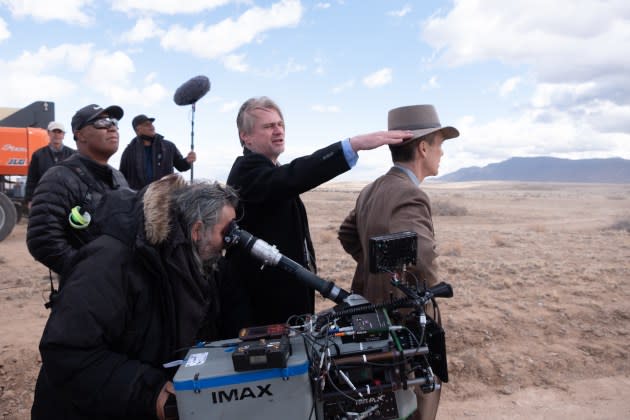IMAX Chief Commits Format To Carry Arab Films & Highlights How ‘Oppenheimer’ Is Pushing Global Sales: “We Owe A Lot To Christopher Nolan” — Red Sea

“The work that exhibitors have done in this market is nothing short of exceptional,” Luke Vetere, Managing Director of Majid Al Futtaim Distribution, one of the largest theatrical distributors in the MENA region, told a crowd of industry figures this morning at Saudi Arabia’s Red Sea Film Festival.
Vetere was among a lineup of panelists who headlined the industry-focused talk titled Redefining the Theatrical Experience in the Post-Streaming Era here in Jeddah. The panel also included Giovanni Dolci, Global Chief Sales Officer at IMAX, Eugene Kim, Content Director – Plus M Entertainment (South Korea), and Alex Walton, Co-Head and Partner at WME Independent.
More from Deadline
“Saudi Arabia has gone from naught to over a quarter of a billion dollars in just four years. 65 cinemas, 615 screens in four years,” Vetere added.
The veteran distributor continued to say there are “very encouraging” signs of growth in exhibition across the Arab world, including the UAE alongside India.
“If you believe the forecasts for our region, we’re looking at getting back to pre-pandemic levels by the end of 2025 with continued and sustained growth from there on,” Vetere said.
So, how is the MENA region managing to buck the trend of declining cinema admissions that continues to plague markets across the Western world?
The answer is complex, according to the panel. Vetere pointed to the “relatively healthy economy in the Gulf,” which he said underpins the market. Uniquely, he also highlighted what he described as the “relatively new” theatrical “infrastructure” in the region. Here, he was referring to modern cinemas in KSA and across the region that hold high-spec tech capabilities and, as such, can provide audiences with a premium experience.
“I think that makes a difference when you’re trying to recreate the habit and get people back into the cinema,” he said.
“The innovation you see in this market, I’m biased, but I believe it’s second to none globally. If you look at the concepts that exhibitors are bringing to market in this region, it’s phenomenal. In the luxury space, especially, you have Vox Theater, Vox Gold, and Movie Suite. There are so many luxury concepts, and that innovation is critical because it differentiates the cinema experience in our region.”
Vetere’s intervention on the quality of exhibition was echoed by IMAX chief Giovanni Dolci, who said it is now obvious that exhibitors cannot continue offering audiences the same products they had “30 years ago.”
“People are no longer willing to pay to go and sit in a bad cinema with broken seats, smelly carpet, a small screen watching a bad movie,” Dolci said.
The long-time IMAX exec added that the “doom and gloom” exhibition statistics that we tend to hear about often come from markets that “unfortunately have aging infrastructure.”
“I think the numbers are swaying because people are no longer going to those cinemas,” he said.
With what the panel described as a rapidly rising exhibition environment in KSA and the wider MENA region, Dolci said that he and his colleagues at IMAX have their eyes set firmly on the Arab world.
“There is no mystery that we are actively looking at the evolution of Arabic content particularly, with a focus in KSA on local production,” he said. “I have no problem stating there will be Arabic movies available in IMAX formats at some point in time.”
Dolci said that IMAX has recorded one of it’s best financial years on record, capturing its largest share of the global box office in the company’s history.
“In 2022, IMAX generated 3.3% of the global box office with a network that represents 0.8%. So it’s a material increase,” he said.
He added that the figures underscore a global trend that if audiences do leave their homes, they are “seeking special experiences” and are willing to pay more money for them.
A prime example of this, Dolci said, was Christopher Nolan’s box office hit Oppenheimer, which he said “had a very positive impact” on the company’s overall performance.
“We owe a lot to Christopher Nolan, and there is a love and commitment to our format. It’s a good example of what you need to do with audiences to offer them something better and special,” he said.
“We work with filmmakers whenever we can right from the production so that they can see their movie with IMAX in mind. Christopher Nolan is the best example of that. He shot the film with our film cameras, and then that message was conveyed to audiences. Only if you do that can you go to your audience and say, ‘OK, if you go and watch it in IMAX in the theaters, I’m giving you a movie that you’ll never watch that way anywhere else.’”
He added: “Consumers are discerning. You can’t fool them and cinema is better just because. We need to give them tangible reasons to come to the theaters.”
Best of Deadline
Carey Mulligan To Receive Palm Springs Film Festival's International Star Actress Award
2023 Premiere Dates For New & Returning Series On Broadcast, Cable & Streaming
2023-24 Awards Season Calendar - Dates For Oscars, Emmys, Grammys, Tonys, Guilds & More
Sign up for Deadline's Newsletter. For the latest news, follow us on Facebook, Twitter, and Instagram.

